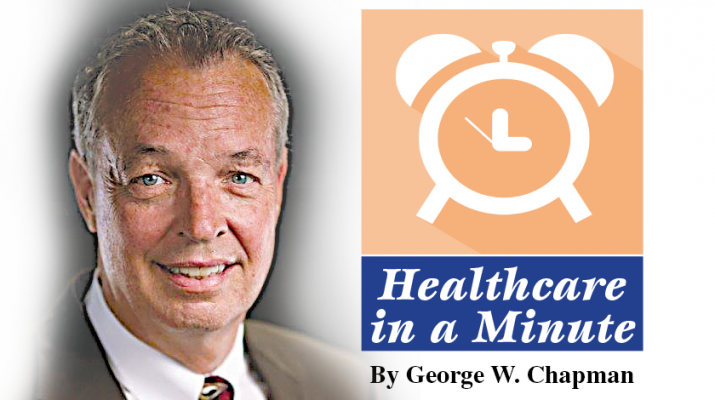By George W. Chapman
The New England Journal of Medicine recently published a study concluding hospital mergers and acquisitions have had little positive impact on the quality of care and typically drive up prices in the market.
The study compared 246 hospitals that were merged or acquired with 1,986 hospitals that weren’t, for: patient experience, mortality, readmissions and clinical process. As expected, the insurance industry was quick to pounce and agree with the study while the hospital industry was quick to rebut. Regardless, many mergers and acquisitions have virtually salvaged financially challenged hospitals that would otherwise be closed. Many rural hospitals would not be open for business if they weren’t affiliated with a larger hospital or hospital system. Mergers make it easier for hospitals to attract, employ and retain scarce nurses and providers while offering a broader more expansive range of services to the consumers of the smaller, more remote or financially strapped facility. The department of justice monitors mergers and acquisitions for any untoward impact on prices.
Bill to Cut Drug Costs Stalled
The bilateral bill passed by the House, which would empower Medicare to negotiate prices on 250 drugs over the next 10 years, is buried in the pile of 275-plus bills sitting on Senate majority leader Mitch McConnell’s desk.
McConnell has “ruled out” taking up the bill which would lower Medicare spending by $456 billion over 10 years. With only two Republican congressmen voting for the bill, it will assuredly die anyway in the Republican-controlled Senate. All the talk by elected officials to control and lower drug costs is stifled by the drug lobby.
Bill to End Surprise Billing Stalled
Both houses of Congress thought ending surprise billing would be a no brainer. But that was before a barrage of last-minute lobbying by non participating providers and healthcare staffing companies that make money via surprise billing.
Congress reached a “compromise” by establishing benchmark rates and an arbitration “backstop” for charges above $750. Vested interests in the status quo will continue to thwart efforts to reform healthcare and lower costs.
ACA Fate Undetermined
President Trump continues to vow to terminate the Affordable Care Act (Obamacare) without offering a viable replacement.
Twenty million Americans are insured via the ACA. There has never been an outcry over the ACA from any of the major stakeholders, designers, or founders — including insurance companies, hospitals, physicians and consumers — because it is working. The courts have ruled the individual mandate to carry insurance was unconstitutional because the penalty to not carry insurance was considered an illegal tax. States against the ACA argue the whole law should be thrown out since the individual mandate was declared unconstitutional. A three-judge panel agrees the individual mandate is unconstitutional but has asked the lower courts to review whether or not the entire ACA should be declared unconstitutional. If the entire ACA is tossed, so will be coverage of pre-existing conditions.
NYS Medicaid Problems
NYS has the most expensive Medicaid program per capita in the country. Most of that can be attributed to relatively generous benefits and some of that can be attributed to fraud and mismanagement.
Roughly: the federal government pays 50%, NYS pays 25% and local municipalities pay the remaining 25%. NYS enrollment has been steady at about 6.2 million people since 2015 thru 2020 (projected). The budget for the same period has increased from $60 billion in 2015 to a projected $74.5 billion this year. That means the per capita cost has increased from $9,677 in 2015 to a projected $12,000 this year. NYS is expecting an overall budget shortfall of $4 billion for the fiscal ending March 31,2020.
Genetic Testing Scam
Scammers are targeting seniors. They offer genetic testing kits, then ask for what they really want … your Medicare number. The scammers can be online, on the phone or in person at health fairs and senior centers. Never agree to genetic testing unless ordered by your physician.
Gun Violence Funding
Congress has authorized $25 million in funding for the Centers for Disease Control and National Institutes of Health to study gun violence, which has become one of the leading causes of death. Forty thousand Americans a year die via gun violence. Sixty percent — or about 24,000 of the deaths — are suicides. Although a relatively paltry amount (we spend over a trillion a year on healthcare) the bipartisan bill was seen as at least a start at addressing the issue and getting some evidence-based data for solutions.
George W. Chapman is a healthcare business consultant who works exclusively with physicians, hospitals and healthcare organizations. He operates GW Chapman Consulting based in Syracuse. Email him at gwc@gwchapmanconsulting.com.

